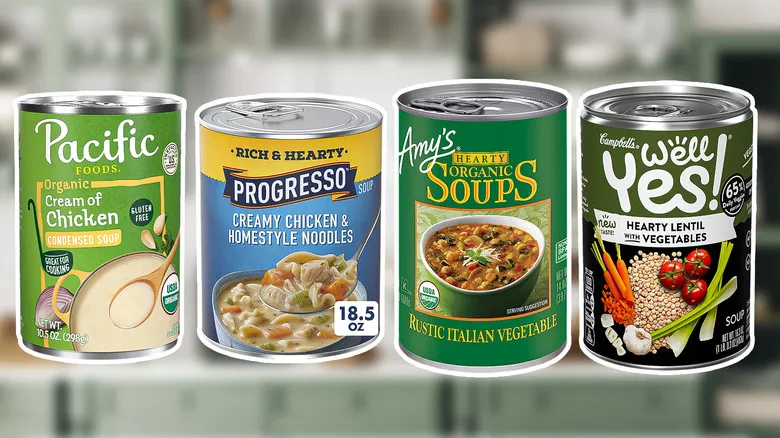Best: Campbell's Well Yes!
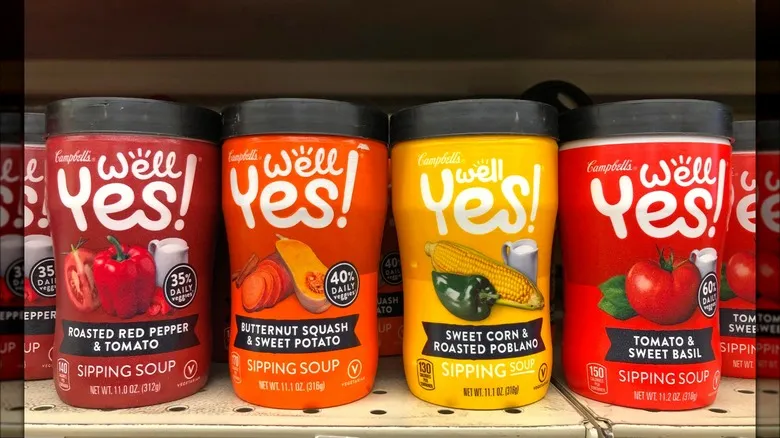
Campbell's is a major contender in the canned soup market. You might have nostalgic memories of enjoying classic Campbell's varieties like chicken noodle, cream of mushroom, or tomato soup. Additionally, there are the robust Chunky soups and exciting new offerings such as the limited-edition Grilled Cheese & Tomato soup. However, some of these soups can be quite high in sodium, and others may include less desirable ingredients like modified cornstarch, MSG, and preservatives. To address these concerns, Campbell's has introduced its Well Yes! line of soups. This collection features nutritious options made with wholesome ingredients, free from preservatives and artificial additives.
The Well Yes! line offers a wide variety of soups, including plant-based options, creamy varieties, and those with chicken and vegetables. They are available in cans, microwaveable bowls, and cups. Compared to Campbell's traditional soups, the Well Yes! options have lower sodium levels and are enriched with vitamins and minerals. For instance, the Well Yes! chicken noodle soup provides 25% of the daily recommended intake of Vitamin A, along with good amounts of protein, iron, and potassium. While the sodium content is still somewhat elevated at 640 milligrams, it is an improvement over the classic chicken noodle soup, which contains 890 milligrams.
Best: Amy's Kitchen
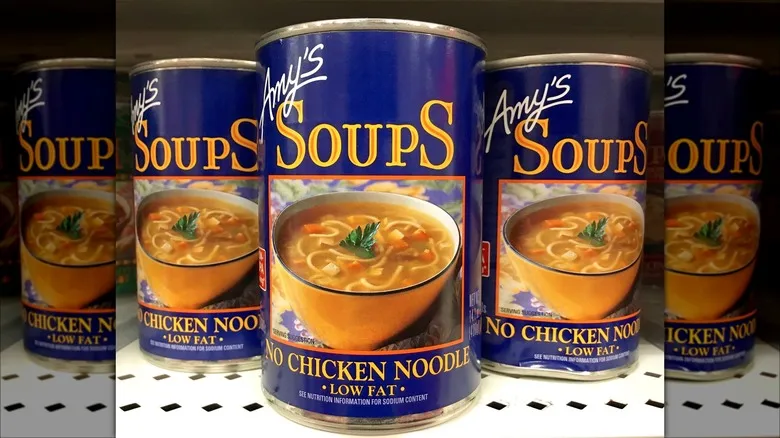
Amy's Kitchen was established in 1987 as a family-owned venture specializing in organic, vegetarian pot pies. It quickly gained popularity, and before long, the Berliner family expanded their offerings to include a diverse array of products such as burritos, pizzas, and soups. Today, all their products remain organic, vegetarian, and made with non-GMO ingredients. The company prioritizes local sourcing whenever feasible but is also committed to obtaining higher-quality ingredients from other regions when necessary.
Amy's Kitchen's organic soup line features classic options like cream of tomato, lentil vegetable, and split pea soup. Additionally, there are globally-inspired varieties such as Thai coconut, Indian golden lentil, and tortilla soup. Most soups are loaded with nutritious vegetables, gluten-free, and free from tree nuts, with several vegan options available. Some soups, like the lentil vegetable and rustic Italian vegetable, are a bit higher in sodium, but the company provides reduced-sodium alternatives for those looking to lower their sodium consumption.
Best: Rao's Homemade
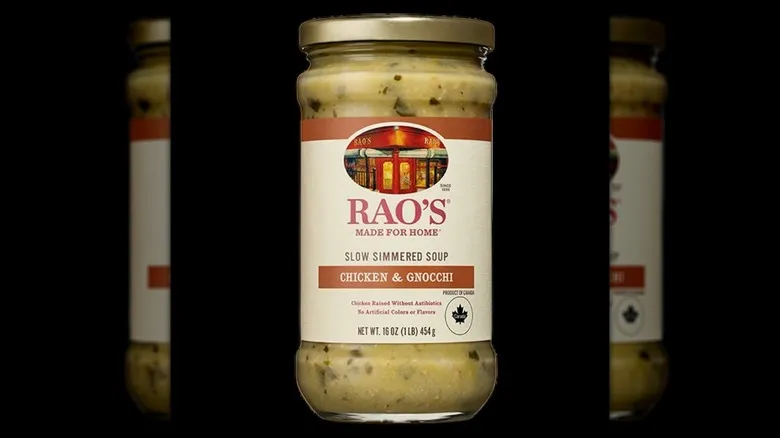
Rao's has been delighting diners with outstanding cuisine for many years. Founded in New York City in 1896, Rao's restaurant has become one of the most renowned Italian eateries in the city, if not the entire nation. Remarkably, it still operates from its original location, a true testament to the quality of its food. In 1992, the family-owned establishment began offering its beloved pasta sauces in jars under the brand name Rao's Homemade, followed by a line of soups introduced in 2019.
Rao's Homemade features a wide variety of Italian-style soups, including tortellini, vegetable, chicken and gnocchi, Italian wedding soup, and potato and sausage. Each soup is carefully slow-simmered using premium ingredients, with no preservatives, artificial flavors, or colors. In an exclusive interview with Mashed, Rao's owner Frank Pellegrino Jr. described the essence of the company's Southern Italian cooking as "simple, clean, ingredient-driven, crafted by mother nature, and how could I possibly alter mother nature?"
If you're in search of high-quality soup, Rao's Homemade is an excellent choice. While it may be pricier than some other brands, many customers believe it’s worth every cent. The company’s pasta sauces are equally exceptional, with their pesto sauce earning a spot on our list of the best store-bought pesto available.
Worst: Progresso Rich & Hearty
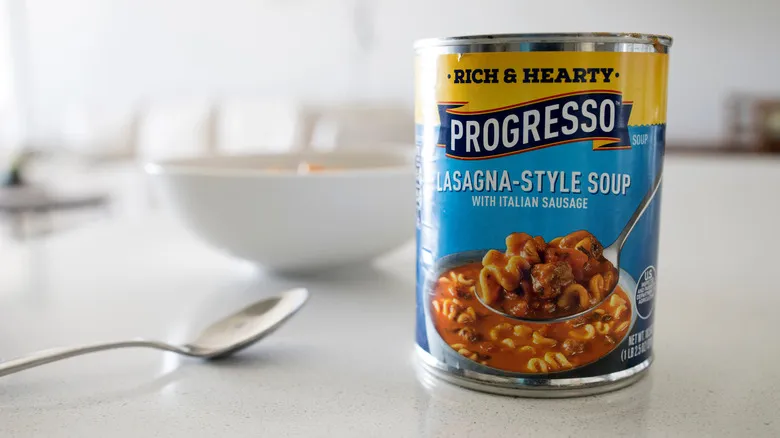
Progresso is a well-known brand of canned soup that is widely available in most grocery stores. The company emphasizes its commitment to using quality ingredients and claims to avoid artificial colors and flavors. However, this doesn't guarantee that all of its soups are healthy options. In fact, Progresso soups are frequently criticized for their high sodium content. Among the least healthy options are those from the Rich & Hearty line, which, as the name implies, includes ingredients designed to be filling, such as pasta, potatoes, and meats.
Many of the Rich & Hearty soups also contain dairy products like cream, milk, and cheese, which are high in saturated fat. Additionally, several varieties include salty meats like sausage or bacon. A particularly unhealthy choice is the Rich & Hearty Broccoli Cheese with Bacon, which has 4.5 grams of saturated fat—approximately 22% of the recommended daily limit—and 800 milligrams of sodium, accounting for 35% of your daily intake. If you're considering a can of Progresso soup, it's advisable to avoid the Rich & Hearty line. Instead, the company's Light and Reduced Sodium options provide similar flavors with significantly lower levels of salt and saturated fat.
Best: Trader Joe's
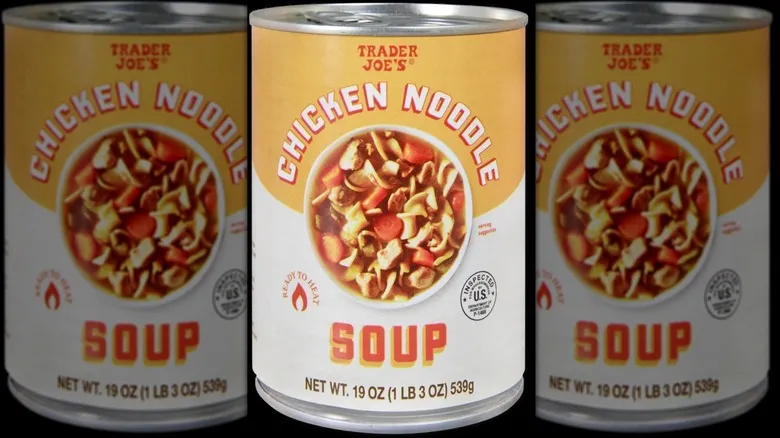
If you enjoy shopping at Trader Joe's, you likely know that the stores are filled with one-of-a-kind food items that you won't find elsewhere. This is due to the company's collaborations with well-known food manufacturers to produce high-quality products exclusively for Trader Joe's. Many of these items are comparable to brand-name products but are offered at significantly lower prices. Among the must-try canned goods at Trader Joe's are their canned soups.
Trader Joe's offers two varieties of canned soups: an organic lentil vegetable soup and a chicken noodle soup. The lentil soup is vegetarian and packed with wholesome ingredients such as organic lentils, spinach, potatoes, and carrots. It is low in fat and rich in iron and dietary fiber. While it does have a sodium content of 700 milligrams, it remains a nutritious option overall. The chicken noodle soup is equally wholesome, featuring white chicken meat, carrots, and natural spices. With only 550 milligrams of sodium, it’s a better choice for those watching their salt intake. Both soups receive excellent feedback from customers who appreciate their flavors and textures. Many claim that these soups rival those of competitors, but are even more attractive due to their budget-friendly prices.
Best: Pacific Foods
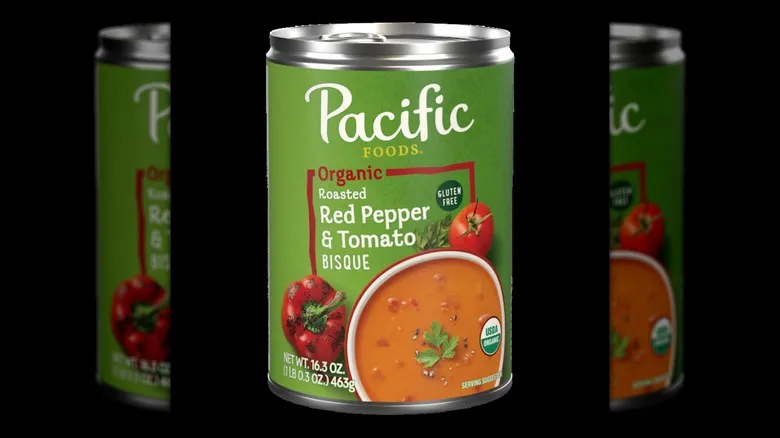
Pacific Foods was established in Oregon in 1987 with the mission of providing wholesome foods crafted from natural, organic ingredients. Today, the company boasts a diverse selection of soups, broths, and chilis, many of which are plant-based and gluten-free. You can choose from creamy soups, hearty varieties, and condensed options that can be enjoyed on their own or used in cooking. The creamy soups are packaged in cartons, while the others are available in cans.
If you're seeking nutritional benefits, Pacific Foods' plant-based soups are an excellent choice. They are generally low in saturated fat and cholesterol, featuring healthy, organic vegetables. For instance, the organic vegetable lentil soup contains no saturated fat, no cholesterol, and provides 14 grams of protein per can, along with a good amount of iron and potassium. However, it's important to note that many of Pacific Foods' soups are high in sodium. Consuming an entire can of the vegetable lentil soup will give you over half of your daily recommended sodium intake.
There’s no denying that Pacific Foods prioritizes high-quality ingredients in its soups. Customers frequently praise the flavors and appreciate the availability of gluten-free and vegan options. However, if you are monitoring your salt consumption, these soups may not be the best fit for you.
Best: Panera At Home
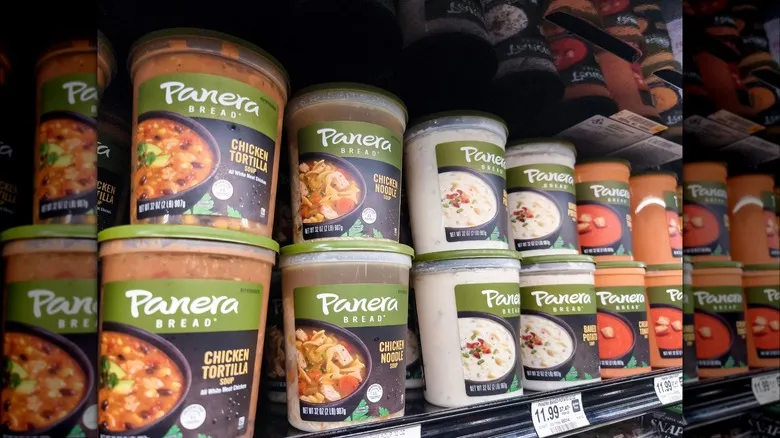
Panera Bread started as a modest bakery in St. Louis and has since expanded to nearly 2,200 locations throughout the United States. The chain is well-known for its comforting sandwiches and soups. In fact, the popularity of their soups has led Panera to offer a selection of pre-packaged soups available in the refrigerated sections of grocery stores like Target and Walmart. These soups are sold in 16-ounce plastic containers and feature flavors such as chicken noodle, black bean, and broccoli cheddar.
At Panera Bread, the focus is on "clean foods," which means they prioritize high-quality ingredients without any artificial preservatives, sweeteners, flavors, or colors. The company even maintains a "No-No List" that outlines the additives they refuse to use in their products. If you check the ingredient lists of their store-bought soups, you'll find primarily wholesome components like antibiotic-free chicken, natural herbs, and real vegetables.
Some of the healthiest soup options at Panera include turkey sausage with kale and quinoa, chicken tortilla, and Italian-style wedding soup. These choices are low in calories and saturated fat while being high in protein. If you're watching your saturated fat and calorie intake, you might want to steer clear of creamy soups like lobster bisque and broccoli cheddar.
Worst: Gardein plant-based soups
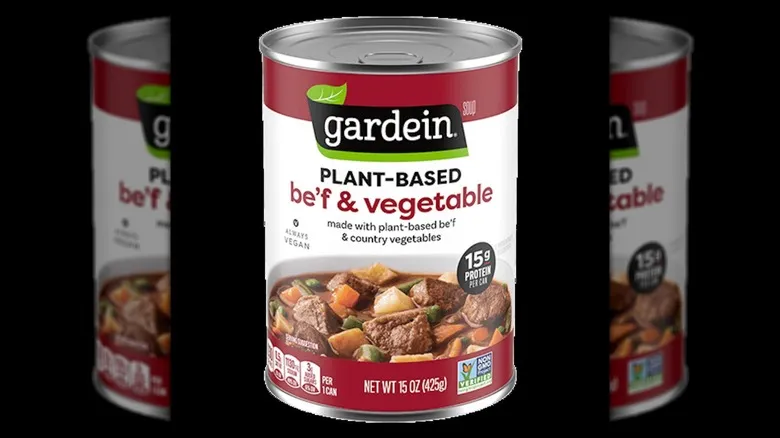
Gardein seeks to attract vegan consumers with its plant-based soups and chilis crafted from vegetables and plant proteins. The brand name cleverly combines "garden" and "protein." The soup names are equally playful, featuring options like Be'f & Vegetable, Chick'n Noodl', and Chick'n & Rice. While you might expect Gardein's vegan soups to be exceptionally healthy due to their lack of meat and emphasis on vegetables, the reality is somewhat different.
Upon examining the nutritional information, you'll find that these soups are surprisingly high in sodium. For instance, the Chick'n Noodl' soup contains 1,070 milligrams of sodium per serving (one can), while the Be'f & Vegetable soup has an even higher sodium content at 1,130 milligrams. Additionally, many of the soups include added sugars and ingredients like methylcellulose and vital wheat gluten. The protein source is soy protein isolate, a highly processed form of soybeans with the fiber stripped away.
Given these factors, it's not surprising that several reviewers have noted that the textures and flavors of Gardein soups leave much to be desired. You might find it more satisfying to prepare homemade vegan soup using canned beans or other natural protein sources.
Best: Imagine
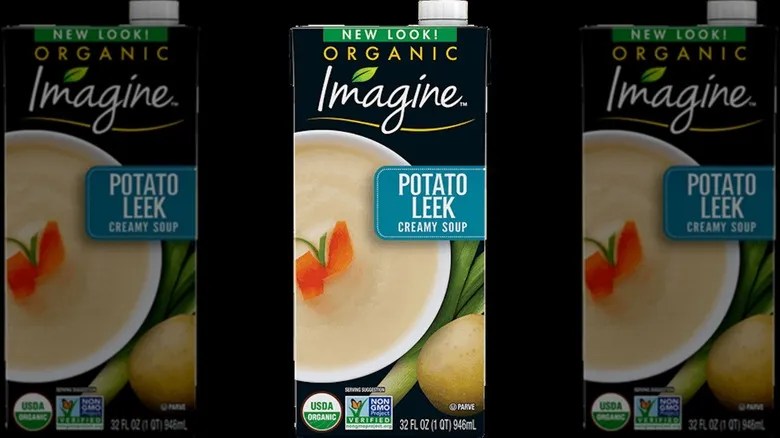
Robert Nissenbaum, the founder of Imagine Foods, was a trailblazer in the all-natural, organic health food movement in the United States. In 1971, he established an organic market in St. Louis, Missouri, well before Whole Foods Market even entered the scene. He went on to launch several successful health food ventures, including Imagine Foods in 1982, which initially specialized in rice-based milk products and later expanded into soups. Today, Imagine Foods stands out as one of the few brands offering creamy soups without any dairy.
The Imagine soups are hard to overlook, thanks to their vibrant cartons showcasing a variety of flavors. You can choose from comforting favorites like creamy potato leek, butternut squash, or creamy tomato basil. For those looking to boost their vegetable intake, the creamy Supergreens soup, featuring spinach, green peas, broccoli, and coconut cream, is a great option. All Imagine soups are USDA-certified organic and made with real ingredients such as vegetables, herbs, and spices. Most are gluten-free, kosher, and vegan. Their creaminess comes from ingredients like organic soy milk, rice flour, and oils such as safflower oil. Additionally, most soups contain no saturated fat and many have about half the sodium compared to other creamy soups available on the market.
Best: Zoup!
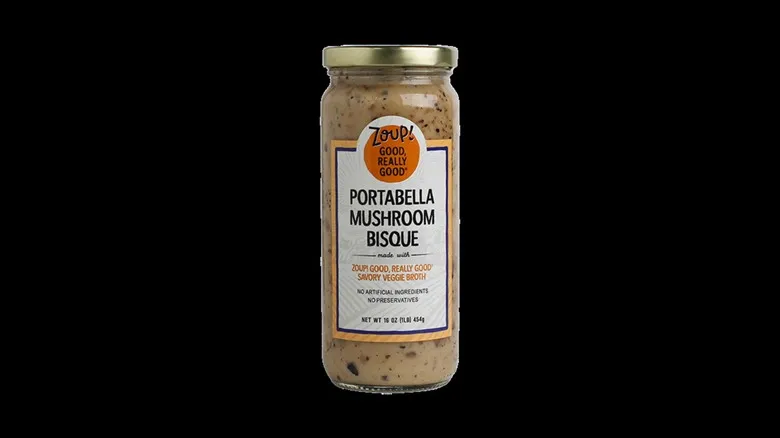
Are you in search of something a bit more unique than the typical tomato or cream of mushroom canned soup? Check out Zoup! soups at your local grocery store. This brand originated as a restaurant chain specializing in gourmet soups. The restaurants gained such popularity that the founders decided to launch a line of ready-to-eat soups for fans to enjoy at home. Available in 16-ounce jars, the soups feature both classic and innovative flavors, including options like butternut squash, portobello mushroom bisque, and chicken pot pie.
If you take a look at the ingredient lists for Zoup! soups, you'll notice that most components are comfortingly recognizable. For instance, the Spicy Chicken "Chilada" soup includes antibiotic-free chicken, tomatoes, roasted corn, and black beans, with no preservatives or artificial additives. While the sodium levels can be a bit elevated, Zoup! soups are generally lower in sodium compared to other brands like Gardein.
In addition, Zoup! provides a range of broth concentrates ideal for cooking. You can choose from bone broths made with chicken or beef, or a vegan "no-chicken" broth concentrate. Many reviewers attest that these broths are indeed flavorful enough to enjoy on their own.
Best: Annie's Homegrown
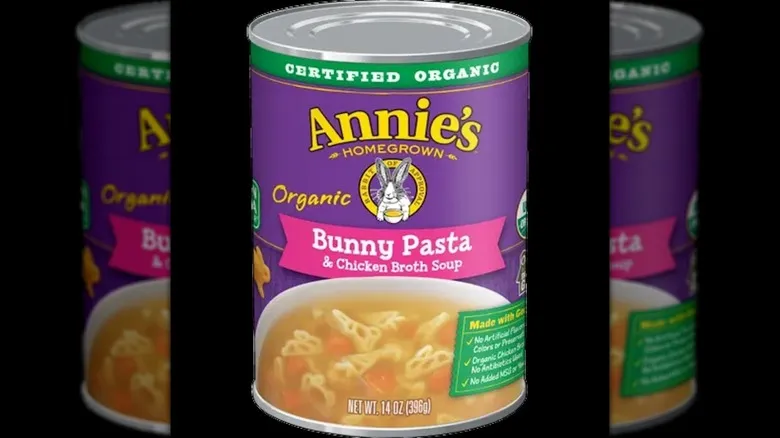
You may recognize Annie's Homegrown soups by their vibrant purple and pink packaging adorned with the cheerful yellow bunny logo. This brand is particularly popular among children, who enjoy the fun animal-shaped noodles and flavorful broths. However, adults can also appreciate these high-quality soups crafted from organic ingredients. The company is dedicated to creating products that are not only nutritious but also environmentally friendly and supportive of the farmers who supply their ingredients. To back this commitment, Annie's Homegrown holds USDA organic certification, Fair Trade certification, and non-GMO verification.
Annie's Homegrown soups are available in a range of flavors, including chicken noodle, vegetable, tomato, and meatballs with pasta and veggies. You can select from soups featuring traditional egg noodles, bunny-shaped pasta, star-shaped pasta, or pasta in playful farm shapes. The chicken broths are made with antibiotic-free chicken, while the vegetable broths contain real vegetables. There are no artificial flavors, preservatives, synthetic colors, yeast extracts, or added MSG—plus, the sodium content is lower than average for canned soups. Overall, these soups are nutritious, delicious, and wholesome.
Worst: Campbell's classic creamy soups
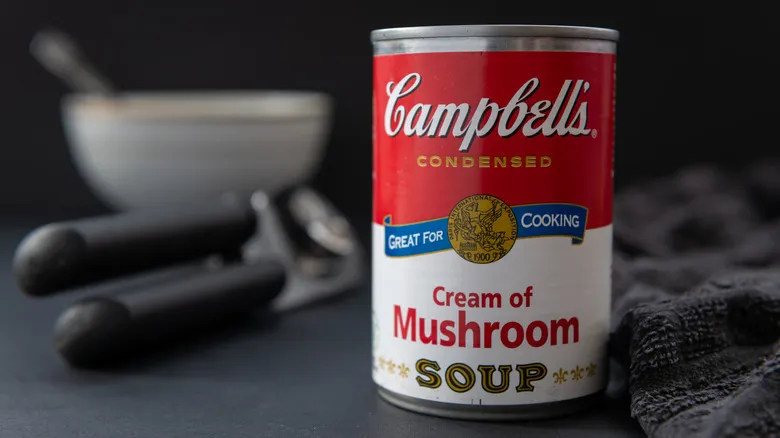
It's undeniable that Campbell's Soup Company ranks among the most cherished soup brands globally. For over 150 years, the company has crafted a wide variety of soups that have brought comfort to countless fans. Among its most popular offerings are the condensed creamy soups, with the Cream of Mushroom variety making its debut in 1934, paving the way for other flavors such as cream of chicken, cream of broccoli, and cream of potato. Additionally, Campbell's provides condensed cream soups infused with flavors like bacon, shrimp, and asparagus.
While these creamy soups have a dedicated following, it's wise to reconsider before indulging in cream of mushroom soup or any other "cream-of" variety. Many of these soups are loaded with sodium; for instance, Campbell's cream of mushroom soup contains a hefty 860 milligrams of sodium. They also include additives such as modified food starch, MSG, and yeast extract, not to mention the cream itself. On a positive note, these soups tend to be relatively low in saturated fat. However, it's probably best to enjoy the classic creamy soups as an occasional treat rather than a regular part of your diet.
Recommended
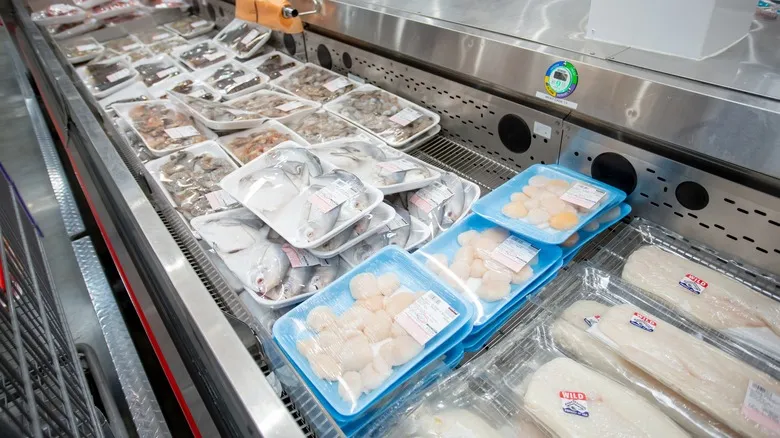
The Frozen Fish We Usually Avoid Buying At Costco
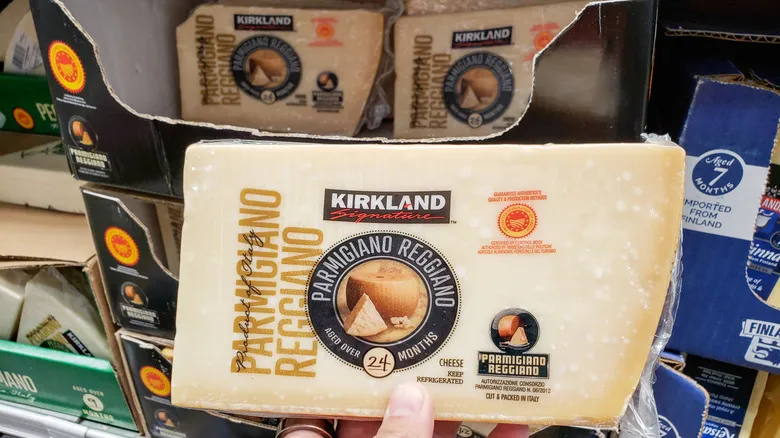
Who Makes Costco's Kirkland Signature Aged Parmigiano Reggiano Cheese

The Baked Good You Can Avoid Buying Next Time You're At Costco

13 Hot Dog Brands That Use Low-Quality Ingredients
Next up

